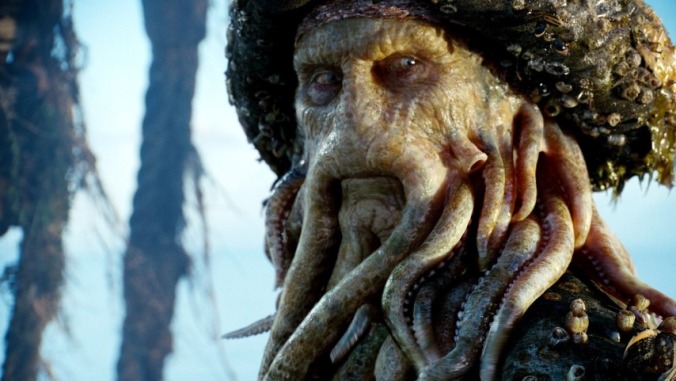Hear Me Out: Pirates of the Caribbean: Dead Man’s Chest
Subscriber Exclusive

Hear Me Out is a column dedicated to earnest reevaluations of those cast-off bits of pop-cultural ephemera that deserve a second look. Whether they’re films, TV series, albums, comedy specials, videogames or even cocktails, Hear Me Out is ready to go to bat for any underappreciated subject.
Cinematic middle children have it rough. This was a common refrain of our previous Hear Me Out entry on The Matrix Reloaded, a gloriously unhinged action spectacle that managed to deepen the mythos of the sci-fi series while delivering fights and choreography on an entirely more ambitious level than its iconic original installment. But almost no one remembers that today, as all of the film’s best and most successful elements were obliterated from the cultural consciousness by the subsequent failure of its preeningly pretentious, overindulgent trilogy capper The Matrix Revolutions, released only six months later. Conceptually, Reloaded proved too interconnected with the ultimate letdown of Revolutions, which served to posthumously drag its reputation down into the abyss.
But such abuses of franchise middle entries are hardly a new phenomenon, as they frequently end up as the most derided films in the sequence. And to be certain, it’s often deserved–you’re never going to see a Hear Me Out entry on Attack of the Clones, I can at least promise you that. But almost the same exact retroactive scorn that was heaped on The Matrix Reloaded also ended up being hurled at another box office juggernaut only a few years later, a movie that went from being one of the highest grossing successes of all time to a film that barely seems to register with audiences now, less than 20 years later. We’re talking, of course, about the soaringly ambitious swashbuckling of Pirates of the Caribbean: Dead Man’s Chest.
Today, Dead Man’s Chest seems to be viewed as as the launching point for a veritable flotilla of soulless Pirates sequels, each more cynically calculated for bland, mass-market palatability than the previous. But this view overlooks the merits of the first Pirates sequel by tying it too closely to the films that followed, denigrating Dead Man’s Chest undeservingly while simultaneously assigning a bit too much credit to the original Curse of the Black Pearl in retrospect. Truth be told, the original entry in the series has not aged as well in reality as it has in the fondness of popular imagination, while its first sequel still holds up quite well thanks to its more expansive imagination and markedly more adult tone, along with the dynamic performances of a few key contributors.
This is the key selling point of Dead Man’s Chest: It is a far more ambitious, grim, lushly appointed and macabre swashbuckling adventure than Curse of the Black Pearl was three years earlier. From its very opening moments it sets this tone, with Captain Jack Sparrow (Johnny Depp) escaping from an absolutely nightmarish island prison fortress that looks like it would be owned and operated by Sauron, amidst the screams of prisoners having their eyes pecked out by crows, floating away in a coffin with the rest of the corpses. Of course Jack isn’t actually dead, but he does come out clutching a clue to the film’s MacGuffin: The “dead man’s chest,” which is said to contain the heart of Flying Dutchman captain/supernatural menace Davy Jones.
Thus begins a sprawling hunt for the heart, which every character wants to possess for their own reasons. Jack needs a bargaining chip to call off his debt with the supernatural figure, payment for once raising The Black Pearl from the depths. Will Turner (Orlando Bloom) needs the heart to both obtain a MacGuffin of his own, free his father from servitude and ensure the safety of his lady love. The former Commodore Norrington (Jack Davenport) needs the heart to redeem himself in the eyes of the Royal Navy, if he wants any chance of ever regaining his former station in life. And overarching, aristocratic antagonist Lord Cutler Beckett (Tom Hollander) wants the heart for mastery over the sea itself, which will allow the East India Trading Company to overcome the last vestiges of the wild and supernatural Caribbean and bend the region entirely to the Crown’s will. Symbolically, this makes Dead Man’s Chest a Tolkien-esque struggle between the romanticism of the old world and the insidious, creeping corruption of modernity and “progress,” a theme that director Gore Verbinski would turn to again in his animated masterpiece/Johnny Depp reunion Rango in 2011. As is again the case there, the literal monsters and beasts of the frontier that initially seem so fearsome ultimately pale in comparison to the evil weight that can be thrown around by small, cruel men with their ledgers and fountain pens.
-

-

-

-

-

-

-

-

-

-

-

-

-

-

-

-

-

-

-

-

-

-

-

-

-

-

-

-

-

-

-

-

-

-

-

-

-

-

-

-








































